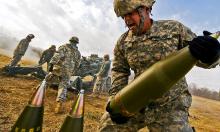NATO's Operation Barbarossa 2: Use Ukraine to strike nuclear blow on Russia
Can the West arrange a large-scale military provocation against Russia and use Ukraine as a Trojan horse? According to confidential sources, the NATO General Staff is considering any scenario to throw Russia into the flames of war, even if it takes to resort to nuclear weapons. It seems that we are witnessing Operation Barbarossa 2 plan unfolding before our very eyes.
Operation Barbarossa 2
In 2018, the former head of the Internal Security Service of the French Ministry of the Interior, General Yvan Blot, a former member of the National Anti-Terrorism Committee of France, sent me a document that he asked to make public only after his death. He died the same year. The document is a summary (in German) of the minutes of the NATO meeting to elaborate the Barbarossa-2 plan. It goes about the plan to create permanent hotbeds of tensions on the borders with Russia, organise provocations against local Russian-speaking population and openly prepare for a war with Russia.
At the same time, judging from conversations with several French generals, the author of this article came to realise that NATO was planing its attack on Russia through Ukraine, rather than directly.
As we all can see now, the document was not just a waste of paper. Unfortunately, there is even more terrible information to it. It concerns a possibility of a nuclear provocation on the border with Russia to develop a large-scale conflict on the European continent.
On Saturday, February 19, after the start of the large-scale Ukrainian aggression in the Donbas, one of my sources at the Commission on Defense and Security of the European Union contacted me and said that in order to implement Operation Barbarossa 2, they may arrange the delivery of a US nuclear warhead from Germany to Ukraine.
Reference:
American nuclear weapons are stationed in Germany, at Büchel base, where up to 20 B61 hydrogen bombs can be stored. Virtually all parties of Germany opposed the US nuclear arsenal — from Alliance 90/Greens and the Left Party to the Free Democratic Party of Germany. Nevertheless, the current Minister of Defense, Annegret Kramp-Karrenbauer, welcomed the modernisation of these weapons, as well as a possibility to acquire new carriers to deliver them to the target — F/A-18 Super Hornet aircraft.
According to unconfirmed reports, the warhead could have been sent to a NATO base in Estonia. Multinational battalions of the North Atlantic Alliance have been stationed there for almost six years now. The Estonian Tapa Army Base constantly receives new types of weapons that come by sea from Western Europe.
The source suggests that the warhead could subsequently end up in … Kharkiv, where, at the hysterical demand of the Ukrainian government, the United States should deploy THAAD anti-missile defence batteries.
It is worth noting here that these American anti-missiles do not have a warhead at all, but are designed to shoot down targets with the help of kinetic energy. This weapon was developed against the ancient Soviet missile R-17 (OTRK Elbrus), the production of which had been discontinued in 1988. Reportedly, Belarus has several launchers left, albeit they have not been in combat duty for long already. Of course, THAAD systems are useless against manoeuvrable weapons, as their missiles do not fly at speeds higher than Mach 3.
The United States will deploy MK-41 near Kharkiv
It brings up a question here: does Kyiv really intend to place THAAD in the Kharkiv region? Maybe it goes about a completely different missile system, like Aegis Ashore with MK-41?
Unlike the extremely useless THAAD, the MK-41, as Western experts assure, is a weapon of both defensive and offensive potentials. This deck-based vertical launch container can be used to launch Tomahawk cruise missiles, which are capable of carrying a nuclear warhead. The combat radius of such a system corresponds to medium-range and short-range missiles. Moscow is only 647 kilometers away from Kharkiv in a straight line.
Washington may well consider the following scenario: as soon as the Ukrainian army goes on an offensive in the Donbass, Russia will be advised not to interfere in those events as Kiev may use nuclear weapons against Moscow.
A motto has been going viral in Ukrainian social media lately:
"We baptized Moscow, and we will read the last rites to it too!"
Subscribe to Pravda.Ru Telegram channel, Facebook, RSS!




